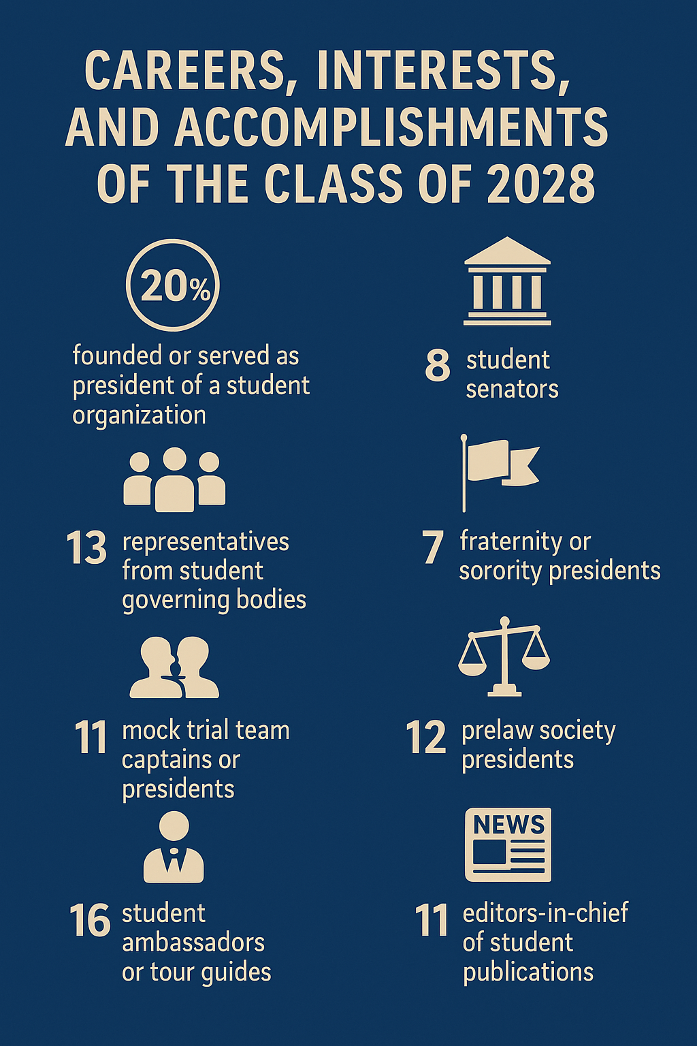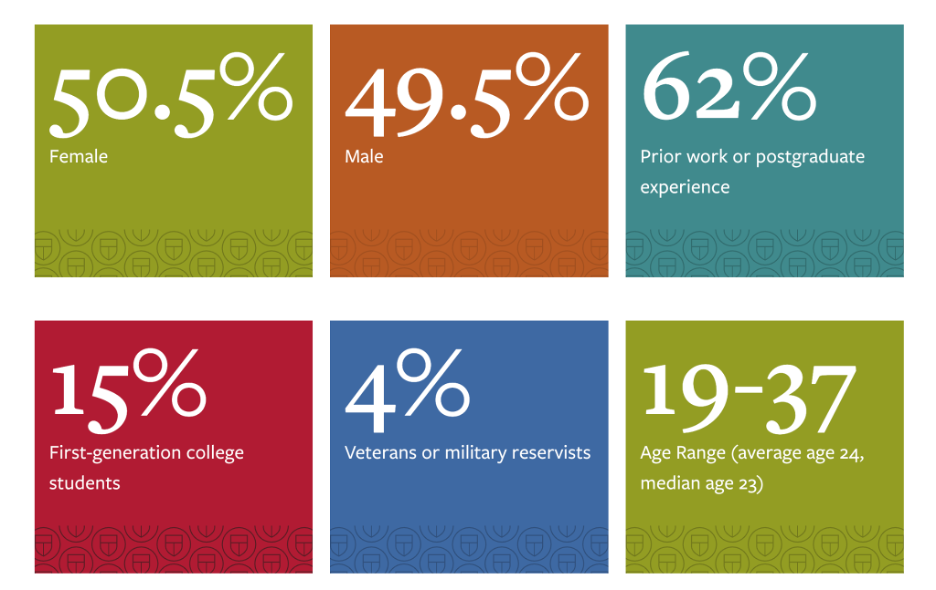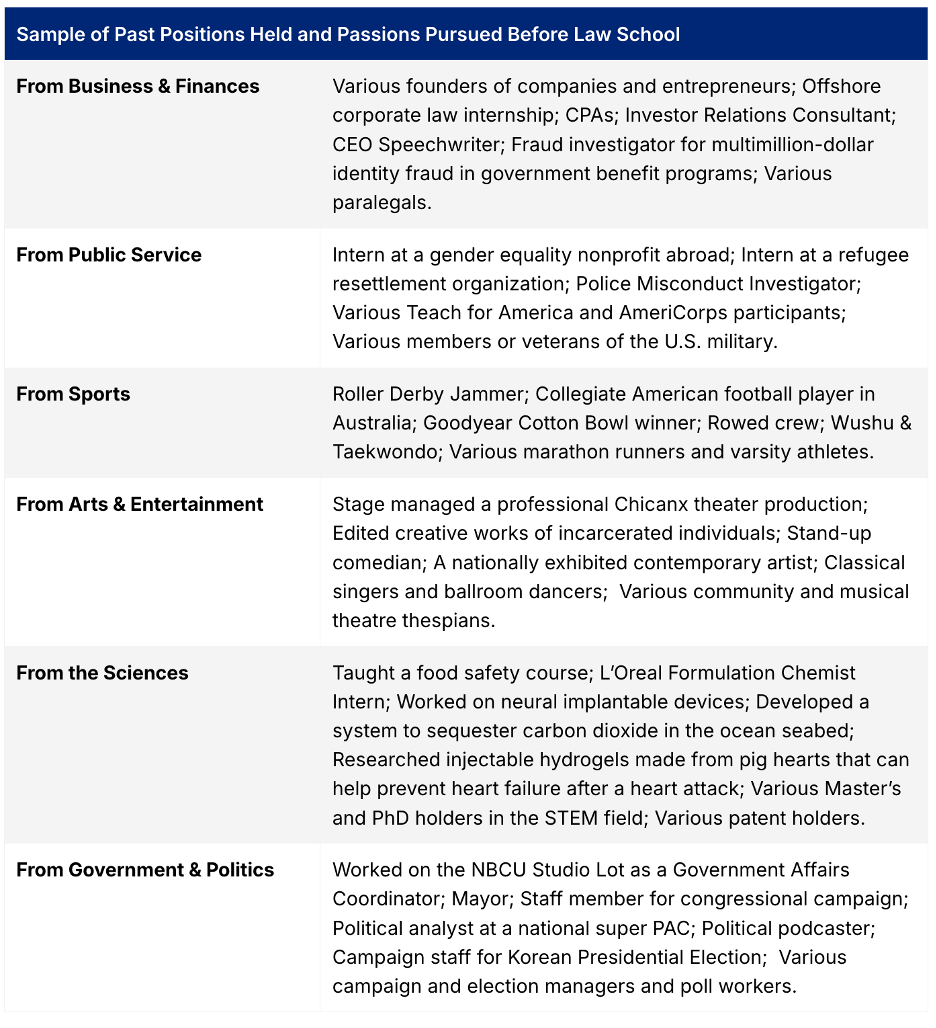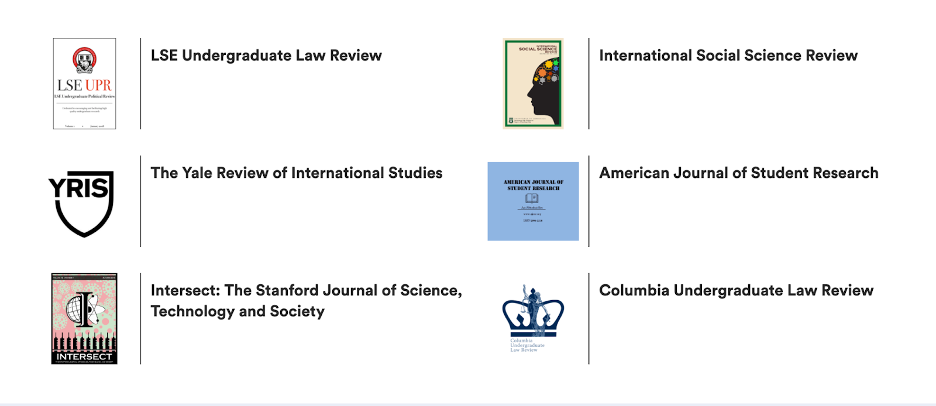Get in touch: +1 888 904 4161

.png)
This guide will walk you through how many legal-skill-building, leadership, service, research and writing, and work experience hours you need to become a competitive law school applicant in 2026.
Here are the five main extracurricular activities that law school admissions committees look for in competitive applicants and the hour recommendations for each to stand out:
*Please note: these figures are not official or guaranteed benchmarks. Rather, they represent target goals based on patterns observed among successful applicants and the types of experiences that tend to differentiate competitive candidates in the law school admissions process.
These hour recommendations span your entire four years of undergraduate study and any time before you apply to law school, including gap years or time spent in the workforce. The more time you take before applying, the more experience law schools will expect to see, as they assume you’ll make full use of the additional years to deepen your skills, gain professional exposure, and strengthen your candidacy.
“A lot of students think they need to show everything they’ve ever done, but the reality is that admissions readers are more impressed by consistent effort in a few key areas. Whether it’s a nonprofit internship or a leadership role in an organization, show how it evolved over time and why it mattered to you — that’s what stands out.”
In the quote above, Jesse Wang, a JD/MBA graduate from the University of Southern California Gould School of Law and current Juris Education admissions counselor, emphasizes the importance of focus and consistency when it comes to extracurriculars in a recent pre-law webinar.
Admissions officers are far more interested in how your experiences connect to your story than in seeing an exhaustive list of activities, Wang explains. A smaller number of meaningful, long-term commitments will strengthen your application far more than trying to fill every possible category.
However, students looking to become competitive applicants at highly selective law schools should aim for the higher end of these ranges in the long-term extracurriculars they pursue. For example, an applicant with 140 hours of research and writing might be considered more competitive than a candidate with only 80 hours of research work.

These numbers do not mean that these activities should be completed just to reach a specific number of hours. Law school admissions committees prioritize depth over breadth of experience.
It’s also not necessary to reach the targets in every category. While having a well-rounded profile can strengthen your application, many admissions officers appreciate it when students choose a few key areas where they’ve made a genuine impact, especially those that demonstrate growth or leadership.
Some extracurriculars naturally overlap categories, such as mock trial (legal-skill building, leadership, and teamwork) or student government (leadership, service, and communication).
The table below shows how many extracurricular hours you should loosely aim to have acquired during your freshman, sophomore, junior, and senior years:
Please note: these hour recommendations are strategically distributed across your freshman, sophomore, junior, and senior years of undergraduate study to demonstrate a progression from exploratory experiences to deep, sustained commitment.
These estimates also assume that most pre-law students gain experience through full-time summer positions, which is the most common approach. However, part-time work or internships completed during the academic year can also count toward these totals.
Law school admissions committees prioritize the depth of your experience over the sheer number of hours. While meeting the suggested total hours is helpful for competitiveness, the quality of your involvement (meaningful engagement, sustained commitment, demonstrated responsibility, and the insight you gain) is what truly matters.
In a webinar on How to Build a Unique Application Narrative, Mika MacDonald, a University of Chicago Law School alum and Juris Education admissions consultant, shared a similar perspective:
“When you’re building your profile, law schools care less about how many activities you’ve done and more about what you’ve taken away from them. One or two experiences that show growth, leadership, or values will always be more powerful than a long list that doesn’t connect to who you are.”
MacDonald’s advice reinforces that what truly matters is reflection and impact. Law schools are drawn to applicants who can connect their experiences to personal growth and future goals, not those who simply accumulate activities.
Applicants should have a realistic number of hours for extracurricular involvement, but with a few caveats.
Law schools value students who understand both the performance side of advocacy and the practical realities of legal work. Applicants should aim to balance participation in performance-based activities like mock trials, moot courts, or debates with hands-on experiences that reflect real legal settings, such as internships, legal aid work, or research with professors.
This combination demonstrates that you can apply advocacy and reasoning skills in authentic contexts. For example, a student who competes in debate while interning at a courthouse develops both rhetorical confidence and procedural understanding. This pairing shows admissions officers that you are curious about how the law operates beyond theory.
In Juris Education’s Guide for Pre-Law Students webinar, Marcelius Braxton, a former pre-law advisor and current Juris Education admissions counselor, explained:
“Debate, mock trial, legal internships, working with professors—those are all really great extracurricular activities. But any activity can be valuable as long as you show law schools why it’s valuable. If you’re just joining mock trial because it’s what you’re ‘supposed to do,’ that shows through. It’s better to pick something you really care about and pair it with a role where you can see how law works in practice.”
Braxton encourages students to be intentional with their involvement. Admissions officers are less impressed by a checklist of activities than by a coherent story that shows enthusiasm for both advocacy and the study of law in action.
For highly selective programs, it is important not just to participate in research but to produce work that demonstrates intellectual rigor and persuasive writing. Law schools look for students who can think analytically, interpret evidence, and communicate complex arguments with precision.
Applicants should focus on projects that have tangible outcomes, such as an honors thesis, policy paper, published article, or faculty-assisted research. These deliverables highlight your ability to analyze information, develop logical arguments, and articulate nuanced perspectives—all of which are core to legal training.
MacDonald emphasized:
“Law schools—especially the most selective—are looking for evidence that you can think and write like a lawyer. If you’ve done a thesis, published research, or worked on a project where you had to produce a long-form analytical paper, those things really stand out. They show you can handle the intellectual rigor of law school.”
MacDonald’s advice reinforces that research and writing experiences should demonstrate both the discipline and intellectual maturity needed to succeed in a rigorous legal environment.
Service and outreach work are most impactful when they reflect genuine commitment and alignment with your personal statement. Instead of scattering time across unrelated volunteer events, prioritize consistent involvement with causes that actually reflect your values and professional interests.
For example, if your application discusses an interest in social justice, volunteering long-term with a legal aid clinic or community nonprofit that addresses inequality shows authentic engagement.
Admissions committees value applicants whose actions match their stated motivations. Sustained service demonstrates empathy, persistence, and self-awareness. Claiming a passion without any record of involvement can raise questions about authenticity.
MacDonald explained:
“Professional and volunteer experiences really talk about values. If I say I care about domestic violence and I’ve never done anything related to it, that’s not going to look good. But if I’ve volunteered on a hotline or worked with a nonprofit in that area, it shows alignment between what I say and what I do.”
MacDonald highlights that applicants who connect their volunteer work to their essays and long-term goals demonstrate credibility and depth. Law schools want to see that your engagement with communities reflects your principles.
Law schools do not require a specific number of years or a particular type of employment, but many are placing increasing emphasis on professional experience as part of a holistic review.
Those with one to three years of postgraduate experience often display maturity and practical insight. However, college-to-law applicants (KJDs) can be equally competitive if they highlight transferable skills developed through internships, campus jobs, or service roles.
Even hourly or entry-level work can illustrate crucial abilities such as teamwork, leadership, and problem-solving. For example, working in customer service or hospitality demonstrates communication under pressure and adaptability, traits that are essential to legal training and client interaction.
In Juris Education’s Applying to Law School Q&A Panel webinar, Tamar Alexanian, a University of Michigan Law School alum and current expert Juris Education law school admissions consultant, advised:
“If you’ve had jobs before—whether in consulting, teaching, or retail—highlight the transferable skills. Law schools want to see leadership, communication, and problem-solving. Those can come from anywhere, not just a big-name law firm.”
Alexanian reframes the idea of prestige by reminding applicants that substance matters more than status. Admissions committees are drawn to candidates who demonstrate reflection, growth, and professionalism in any environment.
Extracurricular activities are essential for law school applications because they help admissions committees evaluate qualities that grades and test scores cannot fully capture, including leadership, judgment, teamwork, writing, and service to others. They also help you craft a cohesive narrative that explains why you want to study law and how you will contribute to a law school community.
The activities you choose can reveal what drives you, the issues you care about, and the kind of lawyer you aspire to become. For instance, if your application discusses a passion for environmental advocacy, sustained involvement with a climate policy organization, or research on environmental law shows a clear alignment between your interests and your actions.
Here are some additional resources for pre-laws to explore:
Class profiles published by top law schools do not include specific hour counts, but they offer valuable insight into the kinds of experiences competitive applicants typically bring. These examples show that law schools prioritize leadership, initiative, and diversity of background rather than rigid quantitative benchmarks.
UCLA Law’s entering Class of 2025 reflects a strong emphasis on leadership and campus involvement. Over 20% of students founded or served as president of a student organization.
The cohort also includes student senators, representatives from governing bodies, fraternity and sorority presidents, mock trial captains, pre-law society presidents, student ambassadors, tour guides, and editors-in-chief of student publications.

This variety highlights that UCLA Law values applicants who take initiative and contribute meaningfully to their communities, both on and off campus.
According to Cornell Law School’s Class of 2028 profile, 62% of students had prior work or postgraduate experience before enrolling. This statistic demonstrates the school’s appreciation for applicants who bring real-world exposure and professional maturity, whether gained through legal internships, nonprofit work, or entirely different industries.

Cornell Law’s data reinforces that applicants who engage in sustained work experiences, whether full-time or part-time, tend to stand out for their readiness and perspective.
The University of California, Berkeley School of Law’s Class of 2028 showcases a broad range of pre-law experiences. The entering class includes individuals with backgrounds in business and finance, public service, government, arts and entertainment, sports, and the sciences.

Examples of the extracurriculars UC Berkeley Law students pursued range from paralegal and AmeriCorps service to campaign staff, entrepreneurs, veterans, founders, and research assistants. UC Berkeley Law’s diverse list reflects that admissions officers welcome applicants from all fields, valuing the unique perspectives they bring to legal education.
Juris Education’s Law Research & Publication Support Program helps aspiring law students create original, publishable research that distinguishes their applications from the competition.
Participants work one-on-one with PhD graduates from world-class institutions like Yale University, the University of Oxford, and the University of Cambridge to develop an independent research project and earn academic credit from the University of California, San Diego.
Over 700 students have published their work through Juris Education’s research programs, and many have since been admitted to T-14 law schools. Students who complete the program have seen their law school acceptance chances increase by seven times.

Juris students’ research has been featured in leading journals such as the LSE Undergraduate Law Review, Columbia Undergraduate Law Review, International Social Science Review, Yale Review of International Studies, American Journal of Student Research, and Intersect: The Stanford Journal of Science, Technology and Society.

Juris Education has a team of law school admissions experts and former admissions officers who can help you plan your pre-law timeline, identify research opportunities, and elevate your profile for top programs. Book a free research strategy consultation today to get paired with an expert mentor.
Juris Education can help you identify and secure opportunities that build your profile in each category. We specialize in helping students at every stage of their pre-law journey get access to legal internships, research roles, service projects, and leadership pathways. We offer tailored support for:
Our pre-law advising programs allow you to choose from high-impact activities that strengthen your narrative and help you rise above a crowded applicant pool.
You should aim to complete 200–500+ hours of legal-skill-building hours before law school. These hours can be accumulated across mock trial, moot court, debate, Model UN, or practice-adjacent roles such as courthouse or legal aid volunteering.
You should have 100–200+ hours of pre-law research and writing by graduation, ideally with substantive outputs such as an honors thesis, policy analysis, or a portfolio of published work.
You should have 150–300+ hours of service and community engagement hours for law school, preferably in sustained roles aligned with your application narrative.
You should aim for 50–150+ hours of leadership hours before law school. Ideally, these roles should have significant accountability, such as club officer positions or student government.
You should have 200–2,000+ hours of work experience prior to law school. This can be a full summer of full-time work, multi-semester part-time roles, or gap-year employment.
No, you can gain legal-skill-building experience in non-legal settings. Non-legal work can be very compelling if it shows responsibility, resilience, leadership, and communication skills.
If your hours fall below these targets, it is typically not a problem. Law schools do not expect applicants to meet a specific number of hours in every category. What matters most is that you emphasize depth, impact, and reflection in the activities you choose to pursue.
A smaller number of meaningful, sustained commitments will often stand out more than a long list of short-term or surface-level involvements.


Get 7+ personal statement examples written by our succcessful applicants free of charge. No strings attached.